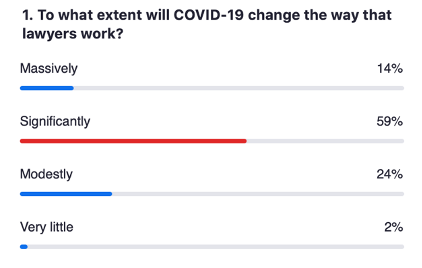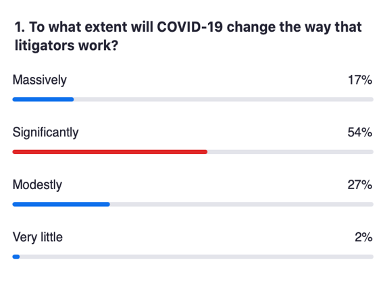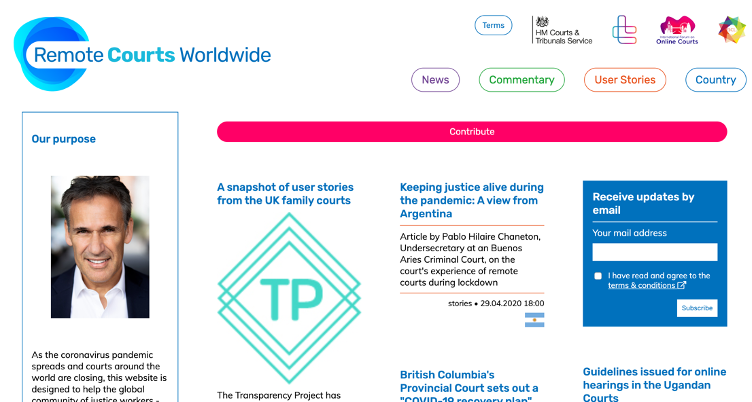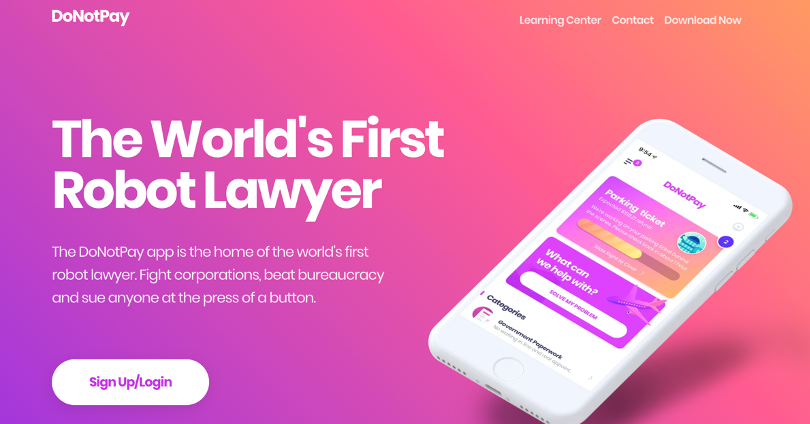Legal Geek “Uncertain decade webinar” with Richard Susskind and Mark Cohen or How will legal life change after the COVID-19 outbreak?
At the dawn of a new decade, businesses face unprecedented challenges in an ever-changing, global market. To help the industry adapt to a new landscape, on the 30th of April Legal Geek brought together two of the most respected names in the industry to hold the first in their series of “Uncertain Decade Webinars”. This event had a global audience from over 60 countries including Russia, from where I joined it.
For 90 minutes, Richard Susskind and Mark Cohen debated the future of the legal industry and tried (as there is no definitive answers really) to answer the following questions: “Legal life after COVID-19 – a very new normal” and “When courts close, what will half the world’s lawyers do?”. Below you can familiarise yourself with eight most important conclusions of the discussion.

“Uncertain decade webinar” from Legal Geek with Richard Susskind and Mark Cohen. Screenshot from the Legal Geek Instagram page
1. Has there been anything like this before?
Before delving into the topic itself, Mr. Cohen reminded us that COVID-19 is not the first crisis the USA has been through. However, neither the Stock Market Crash of 1987 nor the Dotcom Bubble in the late 1990s affected the legal industry so dramatically as the coronavirus currently is.
The Global Financial crisis of 2007-2008 did, however, result in a fundamental reboot of how goods and services were bought and sold and really changed the law. A new model of alternative legal services came into play in the UK, as new players in the legal delivery system, an accelerated disaggregation and a separation between what was construed formally as the practice of law and the business of delivering legal services was seen. This led to a birth of legal operations. But other parts of a legal system didn’t change: law schools barely changed their curriculums, courts were not really modernised and opportunities for access to justice continued to shrink.
2. Why and how is it that COVID really different in terms of legal life? Spoiler (not much): the workforce has become a remote workforce
Here are some things that have happened in the legal industry in the last month or two. The workforce has become a remote workforce: something that most legal providers traditionally resisted. Law firms, in-house legal departments and others now rely on technology as a lifeline for their operations, quickly adapting to it. Law schools had to switch to online distance learning in a matter of days/weeks.
In a remarkably short period of time the legal community started to realise a couple of things: technology enabled lawyers to collaborate wherever they were in the world, and the models upon which the community has been working (the need for a physical space to work together as a team and see clients), are no longer necessary.
Mr. Cohen emphasised that the virus has given us an opportunity and a bright light on how things could be delivered differently. And this is the greatest impact so far.
“People have seen for the first time that legal work may be taken differently.”
3. What is happening? What will happen after the virus is brought after control? Are we going to come back to the way things were? Spoiler: there are some changes in the perception of how the legal services can be delivered, but there will be no radical changes at once
As Mr. Cohen puts it, people are likely to realise (if they haven’t yet) that law is a knowledge business that does not necessarily require coming to a physical space/legal clinic.
Bellwethers of the legal profession, general counsel, are finding “doing more with less, challenging” not only financially but also in terms of taking greater responsibility, as today they are not only expected to be proactive enterprise defenders but they are also equally being called upon to be business collaborators who drive value to enterprises. All in all, legal businesses will have to be more customer-centred and proactive than they’ve ever been, trying to reach out the customer.
Mr. Cohen advises legal services providers, young lawyers and aligned legal professionals to look at GCs and senior legal teams to familiarise themselves with what those challenges are going to be, as they are already living by the laws of future and are very well aware that companies are very focused on digital transformation.
Coronavirus is going to accelerate the fact that consumers, as Mr. Cohen said, are ‘driving the legal bus’. They have now a choice and access to information they have never had before, making law a marketplace with consumers having little interest in what brand you are representing, rather your personal competency.
When it comes to academies, institutions will recognise that education is a lifelong pursuit and will need to rethink not only curriculars but also compositions of faculties. There are going to be more legal professionals, (many without traditional law degrees) and who will have aspirations to better serve clients and society.
As for courts, in most parts of the world they have been “crippled” at the time they are most desperately needed.


Some of the poll results from “Uncertain decade webinar” by the Legal Geek with Richard Susskind and Mark Cohen
Susskind hopes that lawyers are capturing as much data as they can on this massive pilot experiment and note what’s working well, how the innovations can be improved on etc. Leaders and managers should not only manage the business through these difficult times but also see the bigger picture beyond the lockdown, asking themselves such questions as: “To what extent will legal life be fundamentally different?”
Susskind sees it as a revelation how quickly the legal community adapted to the remote working. But notes that the shift in the paradigm has not yet been so successful and no radical changes are expected when the pandemic is conquered. He quotes William Gibson: “The future is already here – it’s just not evenly distributed yet.”
Progressively, traditional legal and court services will no longer default to the same face-to-face hearings/detail/interaction, but still there are major issues of practicability since some people don’t have ideal circumstances to work remotely in the long term.
Both speakers certainly agreed on the following: people have seen for the first time that legal work may be done differently.
4. “When courts close, what will half the world’s lawyers do?” Spoiler: work from home as the only possible way to adjust to the current circumstances
The world’s most cited author on the future of legal services, Richard Susskind, replied without a shadow of a doubt that the future of courts and dispute resolution institutions will have to constitute a new phenomenon whilst half of the courts are already working remotely, and the other half is shutting down.
Susskind notes that the transformation to the online courts scenario was until recently thought to take 10 years. However, as it currently stands, it took roughly 4 months. Remotecourts.org is an example of what is being done in different jurisdictions to ensure ongoing access to justice. Susskind introduces the site with the following words:
“Governments and judiciaries are rapidly introducing various forms of “remote court” – audio hearings (largely by telephone), video hearings (for example, by Skype and Zoom), and paper hearings (decisions delivered on the basis of paper submissions). At remarkable speed, new methods and techniques are being developed.”
According to Susskind, the online hearings experiment has proved to be a good alternative to physical traditional courts. This brings us back to the idea that perception of legal life is changing rapidly due to the coronavirus and that lawyers, litigants and the court will have to be different in the future.
The speakers noted that online courts and electronic ADR as a brand-new market will likely take up to 5 years to work properly.
After this transition period, robes and appeals to judges with “your honour” will fall into oblivion, video hearings are expected to become a predominant way to deliver public service, and litigators will have to acquire new skills because arguments might include graphics”

Remotecourts.org is a collection of examples of how online courts can work to ensure ongoing access to justice in these difficult times
5. How will law firms ensure that trainees and junior associates are going to be supervised properly and enough time is going to be invested in their development? Are partners and senior associates going to have to accept that a significant portion of their time will have to be dedicated to leadership and development which is non-chargeable? Will this impact the overall revenue model of the partnership? Spoiler: that’s not how things are going to be organised
According to Susskind, it will be a mistake that is unlikely to happen. Rather, law firms are going to rethink their legal education by creating simulators for training and learning. However, this raises the overarching question of what should shift to be done by automation rather than trainees.
6. Will digitisation of legal procedures during the pandemic lead to issues in attaining access to justice? Spoiler: it might lead right to the opposite
To date, only 46% of people live with access to the court while access to the internet is much more significant. Hence, digitisation of legal procedures will increase access to justice as a consequence of an access to technology. Online services are to become first call as reaching out through human lawyers is not always possible in some countries. And that is another evidence of how services are transitioning into goods.
A good example of how access to justice can be broadened thanks to technology is the Do Not Pay app created by a Stanford alumni. This started out as a way of challenging parking tickets but has extended to other areas; its chatbots now providing assistance for over 100 different areas. Do Not Pay describes itself as “the world’s first robot lawyer”.

7. Lawyers are treating remote working as a given. Is it only a matter of time before a major security or privacy incident arises or will security incidents trigger a post-COVID-19 return to on-premise working? And what steps should law firms and law companies be taking now to guard against this risk? Spoiler: Cyber-attacks will not make lawyers go back to cubicles
Susskind and Cohen note that risk is endemic to life and law is no different. Undoubtedly, there are going to be breaches (cyber-attacks?), but, according to the speakers, we are certainly not fully going back.
8. Are there any examples of full digital transformation of a traditional law firm? Spoiler: not yet
It is highly unlikely that such law firms exist. But for big 4, or for new firms with no business models yet, that are going to be founded from scratch, the pandemic is an opportunity to become a fully digital game-changer.
Cohen mentioned the USA Boutique called DXC.technology – a pioneering model of digital services that helps “lead digital transformations for customers by modernizing and integrating their mainstream IT, and by deploying digital solutions at scale for a successful digital future.”
“In the near future, embarking on a digital transformation will be a requisite to continue law firms’ relationship with clients”.

If you have been receptive to this article and the ideas contained within it, set your alarm for the future events in the series of webinars held by Legal Geek which will run on 28th May, 25th June and 30th July!

Many thanks to Anna Dulina, an LLM student at City Law School with specialisation in International Commercial Law, for this insightful event review.
Anna is also a member of the Lawbore journalist team for 2019-20.
